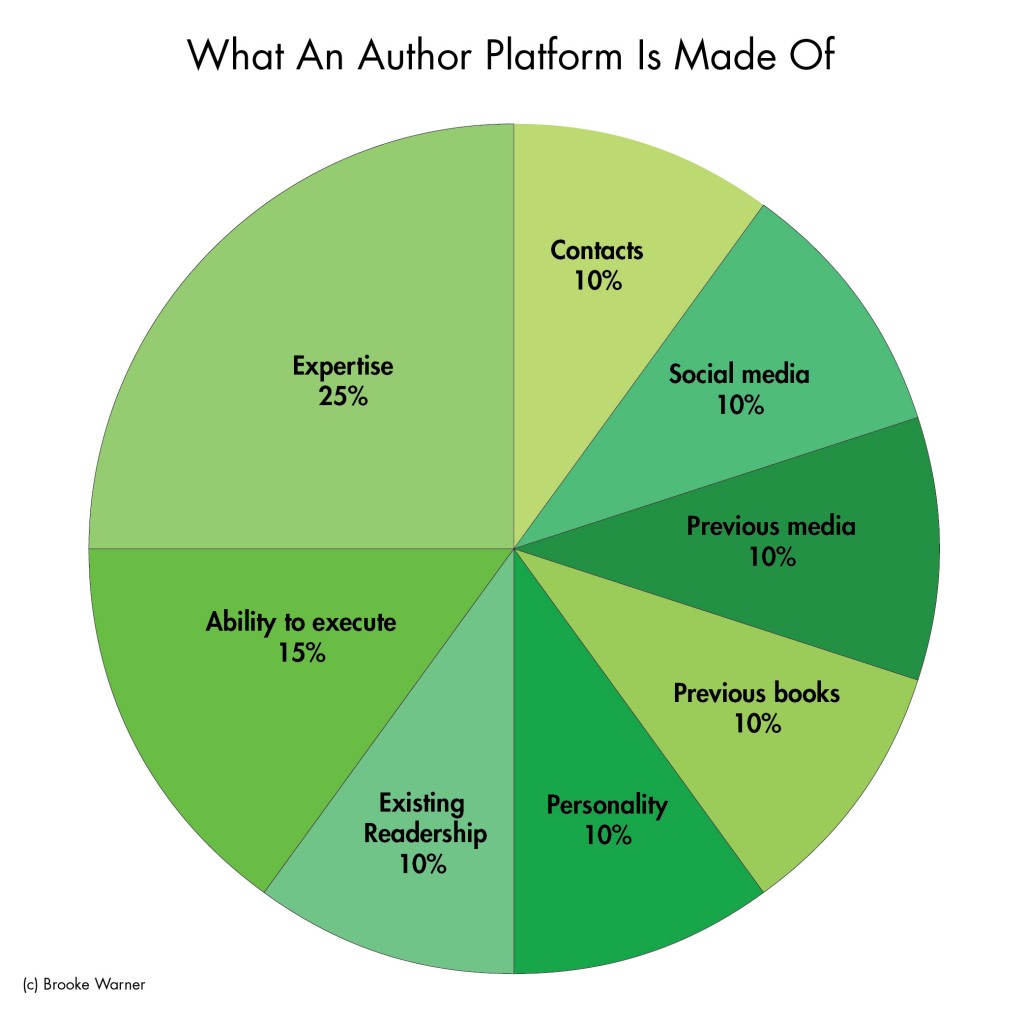Writing a book is hard enough, but marketing it can rapidly become a daunting task. After months of searching, trying, failing and learning new tips, I discovered that any author, self published or traditionally published, should create an author platform where they promote their books across different media and through various channels.
Brooke Warner has posted a beautiful pie chart of what an author platform is made of on The Write Life. The post examines what an editor is looking for in an author platform, in order to take them on. In other words, what mix is deemed successful by editors. However, I believe that the points she makes are valid for self-published authors, too; it’s just that in our case, we are not trying to impress an editor, but rather the general public.
So, what is the right mix for an author platform?
- contacts: the article on Write Life listed two examples about two authors using their contacts to great effect. One of the two had included Ralph Lauren as a contact; the other Oprah Winfrey. It’s kinda hard to beat this sort of references, but the general point was that contacts, be it in advertising, business, church, friends, family and its extended format are useful links that you should use –just don’t overdo it or people will hate you!
- social media: I guess that everybody knows about that by now. Blog, Facebook, Twitter, Pinterest and, in our case, Goodreads are examples of social media that can be used by authors.
- previous media: This refers to previous media interaction –an article in a newspaper, a blog piece as a guest blogger, a radio interview perhaps. Previous media can also be construed as contact with media on an altogether different subject: perhaps as part of your job you were interviewed on radio, you wrote an article or you gave a speech. In any case, it portrays an extrovert personality and a good grasp on how to promote yourself.
- previous books: having a few books up your sleeve is always an additional benefit. I now know that having previous books does not imply that you should have written a trilogy of a Peace-and-War-esque size! Write short stories – particularly fashionable on Amazon, lately -, a novella, a comic or anything original that you can put your name on. The important thing is to keep your stories flowing in a steady rhythm.
- personality: related to the previous media, this is the author’s personality. A likeable, outgoing, and smiling author with a good sense of humor will be more appealing than a grumpy recluse who seems reluctant to interact with the rest of the world. I think that’s applicable to every profession!
- existing readership: having already sold a book and maintaining a readership eager to follow the author is always a boon. An existing readership means that you have followers who can expand geometrically your fans through word of mouth. Of course, obtaining this readership in the first place can be quite intimidating. The question for many of us is ‘how do I get my FIRST readers?’ Well, in my experience, free days can do wonders for new authors.
- ability to execute: Promising the moon, then not delivering is a big no-no in any profession. In the case of an Indie author, the temptation to ignore a deadline or fall behind in our writing can be even greater. An author who writes and is consistent with their writing and marketing is someone who is working hard and has a goal. So, writing just one book and then leaving it there for a year will impress neither editors nor readers, who will probably consider this author as flaky and inconsistent.
- expertise: many of us have not actually studied to become an author. Even English Literature graduates need experience, which is the only way to become an expert on the field. Editors value authors who have expanded their knowledge in order to write their book; they also respect authors who have self-published –successfully- and have acquired a solid proficiency regarding promotion and marketing. This is the kind of people that readers will also trust and whose books they will buy.
So, what’s my takeaway from all this? Simple: If you are committed and persevere, you will succeed, even if you do little or nothing else! About 60% of success is down to experience, which really boils down to writing, publishing, then writing some more…






Your words make great sense, Nicholas! What about when you have no time or energy to promote yourself. Still cannot blog and I master Twitter. One step at a time. I would love to re-blog this, not sure how.
Thanks! 🙂
When you have no energy or time to promote yourself online, you can always do so offline. I was just reading a great post by Chris McMullen on that:
https://chrismcmullen.wordpress.com/2014/12/07/offline-book-marketing/
I have been doing that for a while. Everyone I know is waiting for my book. I even have few reviews already. Thank you, Nicholas, for this link. Sounds great. I will share and read today and see what else I can do.
Reblogged this on bonniegcarter and commented:
Setting up an Author Platform by Nicholas C. Rossis
Thanks for all the tips. Very helpful. 🙂
Thank you and welcome! I’m glad you enjoyed the post! 🙂
Reblogged this on Chris The Story Reading Ape's Blog….. An Author Promotions Enterprise!.
Thanks for sharing Brooke’s post, Nicholas! I’m glad you enjoyed it.
Heather
TWL Assistant Editor
It was a pleasure! Thank you for the always interesting posts! I always refer people to your blog, it’s filled with great info. 🙂
Your Post is helpful, but I really find this thing about an author promoting themselves as very hard work. I am doing that now for my new book, and I have no way of telling whether if it is working.
Lol – believe me, I know how you feel! 🙂 It *is* hard work, and it requires a whole different set of skills.
I’m lucky, in that I’ve already spent the best part of my working life designing and promoting websites, so I was familiar with marketing on the Internet. Even so, I’ve often struggled. For example, publishing a blog post on a daily basis is hard work in itself.
I believe it gets easier with time, though. I’ve noticed that my overall sales rise with each book I publish. The Power of Six didn’t require any free days to sell in a month as many copies as Pearseus #2 in its first six months (outside of free days, of course).
I now aim to put one of my books each month on a countdown deal, having seen how each promoted book helps sell the rest of them, too.
I’ve heard that if you’ve only written the one book, you shouldn’t even bother with promoting. Only after the third one should you worry about that. Personally, I disagree; I think it’s very helpful if you’ve started building your author platform a couple of years before you even publish. I do, however, agree that it’s much harder to promote a single book, compared to a bunch of them.
A very good, sensible post, thank you!
Glad you found it useful! 🙂
Yes you are posting a lot of useful information which I am storing away for future use!
As a fellow squirrel, I thank you for that! 🙂